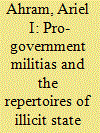| Srl | Item |
| 1 |
ID:
144870


|
|
|
|
|
| Summary/Abstract |
The terms Deep Web, Deep Net, Invisible Web, or Dark Web refer to the content on the World Wide Web that is not indexed by standard search engines. One can describe the Internet as composed of layers: the “upper” layer, or the Surface Web, can easily be accessed by regular searches. However, “deeper” layers, the content of the Deep Web, have not been indexed by traditional search engines such as Google. Michael K. Bergman who wrote the seminal paper on the Deep Web, compared searching the Internet to dragging a net across the surface of the ocean: a great deal may be caught in the net, but there is a wealth of information that is deeper and therefore missed. In fact, most of the Web's information is buried far down on sites, and standard search engines are unable to access it.
|
|
|
|
|
|
|
|
|
|
|
|
|
|
|
|
| 2 |
ID:
144872


|
|
|
|
|
| Summary/Abstract |
Illicit trafficking networks in West Africa are a major funding source for violent extremist groups in the region. Although the United States has formed interagency constructs in the Caribbean and in Europe to counter illicit trafficking, there is a gap in West Africa. The corridor of smuggling routes from the shores of West Africa into North Africa provides extremist groups with the financing they need to continue their activities. By forming a third interagency organization in West Africa, the United States and its partners could strike a significant blow to violent extremist groups, which continue to threaten U.S. interests in the region.
|
|
|
|
|
|
|
|
|
|
|
|
|
|
|
|
| 3 |
ID:
144871


|
|
|
|
|
| Summary/Abstract |
Most studies of pro-government militias (PGMs) take a narrowly functionalist approach. This article sees PGMs as the product of broader processes of state formation and regime dynamics that generate distinctive repertoires of violence. The article uses a cross-national dataset to shows that low state capacity is singularly correlated with the appearance and activity of all forms of PGMs. Once militias are active, they tend to endure even after initial conditions change, suggesting a strong measure of path dependence in how states PGMs evolve. Democracy curbs the activity of semi-official PGMs but not informal ones. Different authoritarian regime sub-types have varying propensities for militia activity. These findings have major implications for efforts to address state frailty.
|
|
|
|
|
|
|
|
|
|
|
|
|
|
|
|
| 4 |
ID:
144873


|
|
|
|
|
| Summary/Abstract |
Why do Human Rights Organizations (HROs) target or “shame” countries for human rights abuses? The literature using country-level factors to explain why one country is likely to be targeted over another is growing but many questions still remain. Terrorist activity in a country should have a positive effect on the amount of shaming directed at a country. HROs are in the publicity business and have organizational interests to shame states already receiving attention. Findings show that there is a connection between certain types of transnational terrorist incidents occur in a country and the amount of HRO shaming of governments, even after accounting for the human rights practices within the state.
|
|
|
|
|
|
|
|
|
|
|
|
|
|
|
|